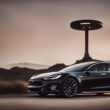A few days ago I was in the Huffington Post read an article by Benjamin Examiner. He had 5 theses on the automotive market of the "future" set up. And he said goodbye to the “status symbol car”!
Five theses on the automotive market of the future
Bye status symbol?
First I wanted to write: All bullshit bingo. All just panic. The usual list posting that you just stumble across on media like the HuffPo. The 10 greatest tits in the world. The 10 best burger cutlery in the world. The 5 hottest yo-yo tricks of the beardless hippsters. The 10 best rotary dial sounds of the past. But then I noticed a mistake in my intended rant:
"Benjamin talks about the future - but he doesn't say which one!"
Tomorrow? In three years? In five? Fifteen? Fivehundred?
Benjamin makes it very easy for himself in his article. In the end, not only does it say “with material from the DPA”, but in the article itself it almost only refers to statements made by others. On studies, on surveys, on preconceived material. My own thoughts on the automotive market of the future seem limited - nevertheless (or because of that?) - I want to take his five points as an opportunity and blog my own thoughts on them.
1.) Self-driving cars will prevail
Absolutely correct. Even if his thesis: “By 2025, 25% of all new cars could drive alone” does not seem very specific. In 10 years? We will certainly have a market in 10 years' time that offers “self-driving” cars. Mercedes-Benz is working flat out on this topic and when the new E-Class is presented in Detroit in January 2016, we will already be able to experience the first “semi-autonomous” assistants in this vehicle. The future is acute faster than we can imagine today.
We must not forget that the technologies for autonomous driving do not come from automobile manufacturers, they come from suppliers. Automobile manufacturers are only those who give the technology a chic cover.
The autonomous automobile is not a “question of the future” - the autonomous mobile is already feasible today. It is the "market" that has to accept it.
2.) Apple and Google are entering the car market
I tend to believe in a supplier role from Apple and definitely from Google. Incidentally, the author provides a good reason in “Thesis 4”, twisting cause and effect. Apple and Google will deliver “feasibility studies” on “mobile autonomy”. Both manufacturers see the automobile as a “tool”, not a product.
As the author notes in thesis 4, both Google and Apple are familiar with products that promise a completely different margin. Both companies are primarily software producers, hardware is left to the others. Nothing will change about this even with the mobility topic.
The thesis should therefore be: Apple and Google want to offer software for the mobility of the future.
3.) Cars become smartphones on wheels
Cars are not becoming smartphones. Cars will combine mobility with social interaction in virtual space. They will be jobs and second homes. in the F015 Mercedes-Benz has a very concise vision of the "automobile of the future" presents. However, in this “prediction”, with this thesis, one should also have the eggs and commit to a period of time. It will take another 015 years for us to fully surrender to “autonomous driving” and accept interior concepts, such as those shown in the F25. It will take a whole generation for smartphone users to become smart-mobile users.
And here I also see the market of the future for Apple and Google. People will want to make offers to users across all “smart devices”. Google as well as Apple are looking for the way into the automobile, because this is the last refuge for offline people so far.
Meanwhile, the automotive industry is showing a massive inability to accelerate its own development cycles to such an extent that the “smart automobile” can also be implemented without the two Silicon Valley giants. Cooperation will therefore become inevitable.
4.) The traditional automakers become suppliers to the software companies.
The sentence does not make sense just considering the structures in the automotive industry. The “autonomous future on wheels”, which is currently - presumably - being investigated and implemented by both Apple and Google, cannot do without the classic suppliers of the automotive industry.
In his thesis, however, the author immediately refutes his assumption. Automobile manufacturers such as Mercedes-Benz or BMW have an enormous lead in the development of automobiles. And they own the production facilities. In contrast to “mobile phones”, this infrastructure cannot be set up “just like that”. And for “cash giants” like Google and Apple, such an infrastructure is an investment that will be considered several times.
The “traditional automakers” will seek cooperation. Agreement will be reached on software and possibly mobility solutions (infrastructure based on user data). The car of the future will not have an Apple or Google logo in - and now I am committed to it - 50 years from now. There will be global players like GM, Ford, Toyota, Mercedes-Benz or Volkswagen.
5. Cars will not be status symbols, but pure means of transportation
Probably. Yes. So in 100 years. Or more. Until then, it is still very important to generations of drivers which car they drive. In his thesis, the author of the article at HuffPo only refers to further studies. Unfortunately, one does not find one's own thoughts on how to represent these in a thesis at this controversial point.
For almost 5 years this “study” of the “young people to whom the smartphone is more important than their own car” has been in the media. And again and again it is forgotten that we are not the center of the world. In growth markets like China, the car is extremely important as a status symbol.
Even in major US cities, the question of mobility remains unbroken. Because in addition to the mega-cities there are “urban areas” in which “commuting” has to be carried out. And individual mobility remains a “style factor”. What does the neighbor think? What my work colleagues? The status of one's own car is far from in jeopardy.
In the end the question remains open. What future is the author talking about? Because if he sees the “big picture”, yes - then - but only then, some of the theses are probably correct. Is the colleague referring to the future 150 years from now? Then my rant is in vain - because then a) nobody remembers his theses and b) my rant would not make sense.
Let's wait and see ...




